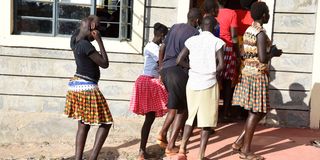Alarm over rising FGM cases in West Pokot

Girls rescued from FGM and early marriages taking refuge at Komesi Resource Centre in Kongelai, West Pokot County on December 08, 2020. An alarm has been raised concerning rising cases of the vice in the region.
What you need to know:
- Two months to Kenya's deadline to end FGM, cases of the vice are rising in West Pokot County.
- Anti-FGM campaigns in the region have faced many challenges, especially because of the porous border and lack of witnesses to testify in courts.
- The areas recording high FGM cases include Alale, Endough, Sook and Tapach.
Kenya, through former President Uhuru Kenyatta, committed to eliminate female genital mutilation (FGM) by the end of 2022. Two months to the deadline and an alarm has been raised over rising cases of the vice in West Pokot County.
Many girls and perpetrators continue to cross the border to neighbouring country Uganda for the cut. Others relocate to get married after the cut, or hide from Kenyan authorities.
Anti-FGM campaigns in the region have faced many challenges, especially because of the porous border and lack of witnesses to testify in courts.
Last week alone, five married women and one girl were cut in the Ombolion area.
Crusaders
As a result of current hunger and the hard economic times, many residents rely on these vices as a source of income, leading to the surge in cases.
The areas recording high FGM cases include Alale, Endough, Sook and Tapach.
Anti-FGM organizations and crusaders in the region are now calling on the government to set up rescue centres along the Kenya-Uganda border to curb the rising cases.
“Poverty and hardship in life have forced them to cut their girls and marry them off to get dowry,” said Domtillah Chesang’, Irep Foundation Director during a workshop on FGM in Kapenguria last week.
Ms Chesang said that despite spirited efforts by various stakeholders to curb FGM, there is a loophole at the Kenya–Uganda border where many school going girls cross to Uganda to get circumcised.
Speaking at the same event, World Vision child protection officer Teresa Cheptoo, noted that the government should consider the remote parts along the border, which still lack basic social amenities like schools.
Livestock
“The government should ensure that school going girls remain in school as their parents and guardians cross over to Uganda in search of pasture and water for their livestock because this is where majority of the girls are exposed,” she said.
Bob Masika a representative of Deutsche Gesellschaft für Wertpapiersparen (DSW) noted that the county and national governments have no clear data on cases of FGM, noting that this has hampered efforts in ending the vice.
Kacheliba Assistant County Commissioner Fredrick Ndubi, said they have put in place measures at the grassroots with the help of the chiefs, to ensure perpetrators are brought to book.
He said they have collaborated with stakeholders, and those infringing on the rights of school going girls are always arrested. He, however, lamented that most of the perpetrators are always released due to lack of evidence, which he says is derailing their efforts.
“We urge the local community to voluntarily give information and evidence when violators are arrested,” he said.





